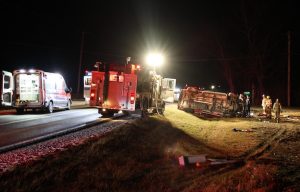Judge hears arguments in Coleman case
Judge Stephen McGlynn heard arguments from both Christopher Coleman and the state Thursday during the convicted murderer’s latest hearing in his post-conviction relief petition case.
McGlynn, who ruled last month he would grant the state’s motion to dismiss Coleman’s petition, declined to rule on the state’s proposed judgment in the case and two motions from Coleman that would delay that judgment, saying he needed more time to consider after hearing the arguments.
The state’s proposed final judgment would dispose of all issues in the case. Coleman’s motions are to stay that judgement pending his review of all files regarding the case and an objection relating to a hearing in the process last year.
For the motion to stay final judgment, Coleman asked he be allowed to review all case files – which he said he has never done – to better appeal McGlynn’s decision.
He gave the example of him recently speaking with a fingerprint expert who had been at the crime scene, reviewed fingerprint evidence and was ready to testify, but who Coleman’s lawyers never subpoenaed at his original trial.
“I’m assuming that’s just one of possibly many in there that I may not be aware of,” said Coleman, who is now representing himself. “I’m just asking for the opportunity to review the discovery and, if need be, put whatever needs to be put on the record concerning it and, if I need to, be able to file a motion for reconsideration.”
Representing the state, appellate prosecutor Charles Zalar argued this motion was unwarranted because McGlynn had already decided to dismiss Coleman’s petition, there is legal precedent showing a defendant is not entitled to the files in these cases, Coleman could bring this up in an ongoing federal habeas corpus case and Coleman has not demonstrated a need for this information.
“He wants to conduct a complete fishing expedition in terms of all of the discovery to see if there might be something out there, which is completely speculative,” Zalar said.
Regarding the motion objecting related to a hearing last year, Coleman said evidence was not admitted from the witness stand at a March 2019 hearing on the metadata on the backs of photos McGlynn decided at an April 2019 was not extraneous.
Metadata is information about other data. In this case, it includes items such as dates when photographs were taken or modified that seem to contradict the timeline the defense outlined for Coleman’s affair with his mistress, Tara Lintz.
The photographs also included uncensored thumbnail images of Coleman and Lintz.
Coleman rehashed many arguments he made last spring, but he mainly contended that since the metadata attached to the back of photographs of Coleman and Lintz was never presented from the witness stand and went back to the jury at his original trial, that violated his constitutional rights to “confrontation, cross-examination and the protection of the court.”
Zalar countered that brief testimony was given on the metadata at trial and he had filed a supplemental motion after the hearing last March, indicating he did not believe it was extraneous.
“It amounts to a big so what,” Zalar said of the importance of the metadata.
Although he declined to rule until a hearing scheduled for Aug. 18, McGlynn said he was not persuaded by Coleman’s argument that thumbnail photos attached to the backs of the larger photographs were prejudicial or extraneous.
“I am sensitive to Mr. Coleman’s comment that the dates, though, on the metadata, were different than what his lawyers had argued to the jury,” McGlynn, who did not get a copy of the state’s proposed judgement until the morning of the hearing, said. “No one in the course of the trial on the defense side took the time to explain why those dates on the metadata could not be taken to explain when the underlying photos were taken or when the data was developed.”






